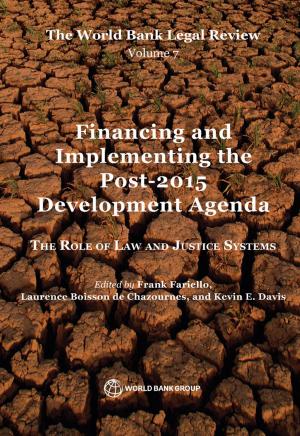Governance Of Technical Education In India: Key Issues, Principles, And Case Studies
Nonfiction, Reference & Language, Education & Teaching, Educational Theory, Educational Reform| Author: | Blom Andreas ; Cheong Jannette | ISBN: | 9780821383414 |
| Publisher: | World Bank | Publication: | April 14, 2010 |
| Imprint: | Language: | English |
| Author: | Blom Andreas ; Cheong Jannette |
| ISBN: | 9780821383414 |
| Publisher: | World Bank |
| Publication: | April 14, 2010 |
| Imprint: | |
| Language: | English |
Higher education, and in particular technical education, is critical to India's aspirations of becoming a major competitive player in the global knowledge economy. The technical education system is huge and complex, and reforms are imperative. Countrywide policies continue to identify Good Governance as key to the success of reforms and investments in higher education.A Learning Forum brought together senior policymakers, leaders and experts from: five States leading in technical education (Andhra Pradesh, Haryana, Karnataka, Maharashtra and West Bengal); Ministry of Human Resource Development, Industry, TEQIP National Project Implementation Unit, and the World Bank. The Forum agreed to nine key governance issues that are central to Good Governance: (i) a new model of an autonomous institution; (ii) Common legal framework for governance; (iii) Strategic planning; (iv) Common quality assurance; (v) Policies for industry/academic collaboration; (vi) Professional development for faculty, leaders and Boards of Governors; (vii) Optimum utilization of resources (xiii) Mentoring institutions gaining autonomous status, and (ix) Policy to tackle faculty shortage. Chapter 1 discusses how this Good Governance agenda depends upon coordinated actions at the faculty, institutional, state, and central level; including a clear list of how each stakeholder can take action.Chapter 2 of this report contains Generic papers on the principles, challenges and common language of governance. The chapter reflects upon the issues and attitudes of state legislators and, at the other extreme, principles for governance of an autonomous institution.Chapter 3 consists of five State case studies that frankly and succinctly describe the dramatic challenges that the State governments face to ensure quality, access, inclusiveness, and relevance in technical education. The case studies documents that these states have strong and positives results from the last decade of experiments with governance reforms such as, academic and financial autonomy, block grant funding, faculty assessments, independent quality audits, and devolution of powers to Institutional Board of Governors. Chapter 4 offers a comparable, succinct and honest overview of challenges and recent reforms within governance of higher education from India, China, Europe, Japan, South Korea, U.K., and the U.S. These case studies discuss global failures and successes from balancing demands for greater institutional autonomy with the government's need to direct strategic economic development and enhance participation in higher education.
Higher education, and in particular technical education, is critical to India's aspirations of becoming a major competitive player in the global knowledge economy. The technical education system is huge and complex, and reforms are imperative. Countrywide policies continue to identify Good Governance as key to the success of reforms and investments in higher education.A Learning Forum brought together senior policymakers, leaders and experts from: five States leading in technical education (Andhra Pradesh, Haryana, Karnataka, Maharashtra and West Bengal); Ministry of Human Resource Development, Industry, TEQIP National Project Implementation Unit, and the World Bank. The Forum agreed to nine key governance issues that are central to Good Governance: (i) a new model of an autonomous institution; (ii) Common legal framework for governance; (iii) Strategic planning; (iv) Common quality assurance; (v) Policies for industry/academic collaboration; (vi) Professional development for faculty, leaders and Boards of Governors; (vii) Optimum utilization of resources (xiii) Mentoring institutions gaining autonomous status, and (ix) Policy to tackle faculty shortage. Chapter 1 discusses how this Good Governance agenda depends upon coordinated actions at the faculty, institutional, state, and central level; including a clear list of how each stakeholder can take action.Chapter 2 of this report contains Generic papers on the principles, challenges and common language of governance. The chapter reflects upon the issues and attitudes of state legislators and, at the other extreme, principles for governance of an autonomous institution.Chapter 3 consists of five State case studies that frankly and succinctly describe the dramatic challenges that the State governments face to ensure quality, access, inclusiveness, and relevance in technical education. The case studies documents that these states have strong and positives results from the last decade of experiments with governance reforms such as, academic and financial autonomy, block grant funding, faculty assessments, independent quality audits, and devolution of powers to Institutional Board of Governors. Chapter 4 offers a comparable, succinct and honest overview of challenges and recent reforms within governance of higher education from India, China, Europe, Japan, South Korea, U.K., and the U.S. These case studies discuss global failures and successes from balancing demands for greater institutional autonomy with the government's need to direct strategic economic development and enhance participation in higher education.















